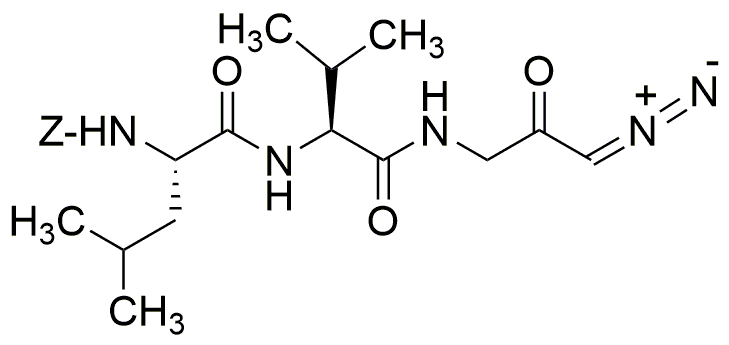Z-Leu-Val-Gly-diazomethylketone is widely utilized in research focused on:
- Peptide Synthesis: This compound serves as a crucial building block in the synthesis of peptides, allowing researchers to create specific sequences for studying protein functions and interactions.
- Drug Development: It plays a significant role in the pharmaceutical industry, particularly in the development of new drugs targeting various diseases by modifying peptide structures for enhanced efficacy.
- Bioconjugation: The compound is used in bioconjugation processes, where it helps attach biomolecules to surfaces or other molecules, facilitating the creation of targeted therapies and diagnostics.
- Research in Enzyme Inhibition: It is valuable in studies aimed at understanding enzyme mechanisms, as it can act as an inhibitor, providing insights into metabolic pathways and potential therapeutic targets.
- Analytical Chemistry: The compound is employed in analytical methods to identify and quantify peptides in complex mixtures, aiding in quality control and research applications.
Informations générales
Propriétés
Sécurité et réglementation
Applications
Z-Leu-Val-Gly-diazomethylketone is widely utilized in research focused on:
- Peptide Synthesis: This compound serves as a crucial building block in the synthesis of peptides, allowing researchers to create specific sequences for studying protein functions and interactions.
- Drug Development: It plays a significant role in the pharmaceutical industry, particularly in the development of new drugs targeting various diseases by modifying peptide structures for enhanced efficacy.
- Bioconjugation: The compound is used in bioconjugation processes, where it helps attach biomolecules to surfaces or other molecules, facilitating the creation of targeted therapies and diagnostics.
- Research in Enzyme Inhibition: It is valuable in studies aimed at understanding enzyme mechanisms, as it can act as an inhibitor, providing insights into metabolic pathways and potential therapeutic targets.
- Analytical Chemistry: The compound is employed in analytical methods to identify and quantify peptides in complex mixtures, aiding in quality control and research applications.
Documents
Fiches de données de sécurité (FDS)
La FDS fournit des informations de sécurité complètes sur la manipulation, le stockage et l’élimination du produit.
Spécifications du produit (PS)
Le PS fournit une description complète des propriétés du produit, notamment sa composition chimique, son état physique, sa pureté et les exigences de stockage. Il détaille également les plages de qualité acceptables et les applications prévues du produit.
Certificats d'analyse (COA)
Recherchez des certificats d'analyse (COA) en saisissant le numéro de lot du produit. Les numéros de lot et de lot se trouvent sur l'étiquette d'un produit, après les mots « Lot » ou « Lot de fabrication ».
Numéro de catalogue
Numéro de lot/série
Certificats d'origine (COO)
Ce certificat d'exploitation confirme le pays dans lequel le produit a été fabriqué, et détaille également les matériaux et composants utilisés et s'il est issu de sources naturelles, synthétiques ou autres sources spécifiques. Ce certificat peut être requis pour les douanes, le commerce et la conformité réglementaire.
Numéro de catalogue
Numéro de lot/série
Fiches de données de sécurité (FDS)
La FDS fournit des informations de sécurité complètes sur la manipulation, le stockage et l’élimination du produit.
DownloadSpécifications du produit (PS)
Le PS fournit une description complète des propriétés du produit, notamment sa composition chimique, son état physique, sa pureté et les exigences de stockage. Il détaille également les plages de qualité acceptables et les applications prévues du produit.
DownloadCertificats d'analyse (COA)
Recherchez des certificats d'analyse (COA) en saisissant le numéro de lot du produit. Les numéros de lot et de lot se trouvent sur l'étiquette d'un produit, après les mots « Lot » ou « Lot de fabrication ».
Numéro de catalogue
Numéro de lot/série
Certificats d'origine (COO)
Ce certificat d'exploitation confirme le pays dans lequel le produit a été fabriqué, et détaille également les matériaux et composants utilisés et s'il est issu de sources naturelles, synthétiques ou autres sources spécifiques. Ce certificat peut être requis pour les douanes, le commerce et la conformité réglementaire.


